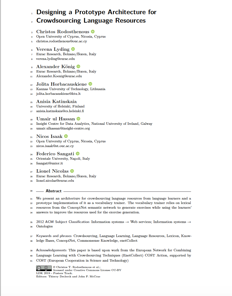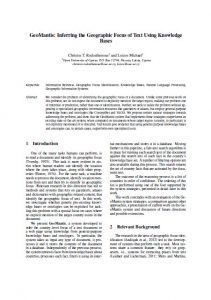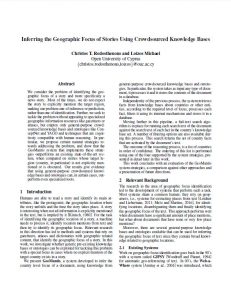ORCID | DBLP | Scopus | Google Scholar | ResearchGate | Web Of Science | Semantic Scholar | MathSciNet
2019 |
|
 | Rodosthenous, Christos; Lyding, Verena; König, Alexander; Horbacauskiene, Jolita; Katinskaia, Anisia; ul Hassan, Umair; Isaak, Nicos; Sangati, Federico; Nicolas, Lionel Designing a Prototype Architecture for Crowdsourcing Language Resources Proceedings Article In: Declerck, Thierry; McCrae, John P. (Ed.): Proceedings of the Poster Session of the 2nd Conference on Language, Data and Knowledge (LDK 2019), pp. 17–23, CEUR, 2019. Abstract | BibTeX | Tags: Commonsense Knowledge, ConceptNet, crowdsourcing, enetCollect, Knowledge Bases, Language learning, Language Resources, Lexicon | Links: @inproceedings{enetcollect1,We present an architecture for crowdsourcing language resources from language learners and a prototype implementation of it as a vocabulary trainer. The vocabulary trainer relies on lexical resources from the ConceptNet semantic network to generate exercises while using the learners' answers to improve the resources used for the exercise generation. |
2018 |
|
 | Rodosthenous, Christos; Michael, Loizos GeoMantis: Inferring the Geographic Focus of Text using Knowledge Bases Proceedings Article In: Rocha, Ana Paula; van den Herik, Jaap (Ed.): Proceedings of the 10th International Conference on Agents and Artificial Intelligence (ICAART2018), 2018. Abstract | BibTeX | Tags: Geographic Focus Identification, Geographic Information Systems, Information Retrieval, Knowledge Bases, Natural Language Processing | Links: @inproceedings{Rodosthenous2018,We consider the problem of identifying the geographic focus of a document. Unlike some previous work on this problem, we do not expect the document to explicitly mention the target region, making our problem one of inference or prediction, rather than one of identification. Further, we seek to tackle the problem without appealing to specialized geographic information resources like gazetteers or atlases, but employ general-purpose knowledge bases and ontologies like ConceptNet and YAGO. We propose certain natural strategies towards addressing the problem, and show that the GeoMantis system that implements these strategies outperforms an existing state-of-the-art system, when compared on documents whose target region (country, in particular) is not explicitly mentioned or is obscured. Our results give evidence that using general-purpose knowledge bases and ontologies can, in certain cases, outperform even specialized tools. |
2017 |
|
 | Rodosthenous, Christos; Michael, Loizos Inferring the Geographic Focus of Stories Using Crowdsourced Knowledge Bases Workshop Cognition and Artificial Intelligence for Human-Centred Design (CAID2017), 2017. Abstract | BibTeX | Tags: Geographic Focus Identification, Geographic Information Systems, Information Retrieval, Knowledge Bases, Natural Language Processing @workshop{Rodosthenous2018b,We consider the problem of identifying the geographic focus of a story and more specifically a news story. Most of the times, we do not expect the story to explicitly mention the target region, making our problem one of inference or prediction, rather than one of identification. Further, we seek to tackle the problem without appealing to specialized geographic information resources like gazetteers or atlases, but employ only general-purpose crowdsourced knowledge bases and ontologies like ConceptNet and YAGO and techniques that are cognitively compatible with human reasoning. In particular, we propose certain natural strategies towards addressing the problem, and show that the GeoMantis system that implements these strategies outperforms an existing state-of-the-art system, when compared on stories whose target region (country, in particular) is not explicitly mentioned or is obscured. Our results give evidence that using general-purpose crowdsourced knowledge bases and ontologies can, in certain cases, outperform even specialized tools. |
